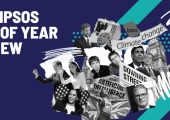Tory Leadership
Michael Portillo's exclusion from the Tory leadership race may have taken both his colleagues and the media by surprise, but it was following the trend of public opinion over the last few weeks which has seen him lose much ground.
Michael Portillo's exclusion from the Tory leadership race may have taken both his colleagues and the media by surprise, but it was following the trend of public opinion over the last few weeks which has seen him lose much ground.
In two MORI surveys during the election (for the Sunday Telegraph [Week 4 Election Poll] and The Economist [Expectations Of Future Government]), when we asked the public who should take over the leadership if William Hague were to step down, Mr Portillo was the clear front runner among Conservative supporters, and even among the public as a whole he was neck and neck with Kenneth Clarke. Mr Clarke's opponent in the final ballot, Iain Duncan-Smith, barely troubled the scorer; the clear choice of a third candidate appeared to be Ann Widdecombe.
Q If the Conservatives lose the General Election and William Hague* steps down as party leader, which one of the politicians I am going to read out, if any, would you like to see lead the Conservative Party?
| 160 | 31 May - 2 Jun 2001 | 4-5 Jun 2001 | ||
| 160 | All | Con voters | All | Con voters |
| 160 | % | % | % | % |
| Michael Portillo | 15 | 22 | 18 | 29 |
| Ann Widdecombe | 12 | 13 | 10 | 12 |
| Margaret Thatcher | 8 | 11 | 7 | 11 |
| Kenneth Clarke | 17 | 11 | 15 | 10 |
| John Redwood | 4 | 8 | 4 | 4 |
| Malcolm Rifkind | 3 | 2 | 3 | 3 |
| Francis Maude | 2 | 4 | 1 | 2 |
| Iain Duncan-Smith | 1 | 2 | 1 | 1 |
| Liam Fox | 2 | 3 | 1 | 1 |
| Bill Emmott | n/a | n/a | * | * |
| David Davis | * | 1 | * | 0 |
| Other | 1 | 2 | 2 | 4 |
| None of these | 14 | 6 | 12 | 6 |
| Don't know | 21 | 15 | 26 | 16 |
Source: MORI
Although Mr Portillo had a clear lead in these rankings, though, it made no significant difference to voting intentions. When we asked (in the Sunday Telegraph poll, 31 May-2 June [Week 4 Election Poll]) how our respondents would vote if Mr Portillo or Mr Clarke were leader, the Tories scored 28% in both cases (which was only a fraction above the 27% who had already said they would vote Tory with William Hague as leader). In fact it was Miss Widdecombe who performed best in that poll, pulling the Tory share up to 31%.
Since the election, though, there has been a shift of attitudes. Our poll for The Times at the end of last month [Political Attitudes in Great Britain] again asked the public who they thought would do the best job of leading the party, giving the five nominated leadership candidates as the options. Now it was Mr Clarke who had a commanding lead, with 32% naming him and only 17% Mr Portillo; Mr Duncan-Smith (7%), Mr Ancram (6%) and Mr Davis (4%) trailed well behind, though that is only to be expected as - not being former Cabinet ministers like the other two - they are far less well known to the man in the street.
ICM's poll for the Guardian this week [Fresh Blow To Portillo's Hopes] found a similar conclusion though using a different form of question. They asked whether respondents would be more or less likely to vote Conservative under the leadership of each of the final three candidates: Mr Clarke scored a net +4 (26% more likely as against 22% less likely), Mr Duncan-Smith -8 and Mr Portillo -24. They also found that while only 7% of the public admitted not having heard of Mr Portillo and 8% of Mr Clarke, 22% said they hadn't heard of Mr Duncan-Smith.
The gap was narrower, though, when we looked only at those currently supporting the Tories: in that case Mr Clarke's lead was only 29% to 25%. Similarly, when we put Kenneth Clarke and Michael Portillo in a head-to-head contest as best candidate, Mr Clarke triumphed two-to-one among the whole general public (51% to 25%), but only 49% to 39% among Tories.
This difference has two implications. The first, assuming that the paid-up Conservative members are likely to be more similar to Tory voters than to the public as a whole, is that notwithstanding Mr Clarke's substantial lead among the public the leadership vote itself, had those been the two candidates, might have been rather less predictable. The other, though no surprise, is that Mr Clarke is the better equipped to appeal to those currently supporting other parties or no party at all.
It is interesting to note, though, that when we look at which groups of the population supported each candidate, Mr Portillo had higher than average support among younger age groups. It is possible that though of less wide appeal to non-Conservatives at the moment, Mr Portillo would have had a greater potential than Mr Clarke to spread the Conservative message wider into groups where the party is weak at the moment.
But now the choice is Mr Clarke or Mr Duncan-Smith and here it is more difficult to draw deep insights because Mr Duncan-Smith is so little known. The views of the ordinary Conservative voters may well not reflect those of the party activists, who will likely have a far clearer view of shadow cabinet members; nor is the general public's current attitude much clue as to how they will receive him if he is elected leader. Unlike Mr Clarke, he starts with a clean slate. The same was fairly true of William Hague, and he was not a success; on the other hand Paddy Ashdown was quite as obscure when elected leader, yet eventually was an undoubted asset to his party.
When we asked the public during the election campaign which qualities in a leader were most important in helping them decide whether to vote for his or her party, the description that most thought "very important" was that the leader should understand the problems facing Britain, and following that that he should be capable and good in a crisis. By contrast, far fewer thought it was very important that he should have "a lot of personality". Tory members should probably ask themselves which of the two remaining candidates can most convincingly put these qualities across.
Note: Since I wrote this column on Thursday, figures from a new MORI poll for the Mail on Sunday [Constituency Chairmen Poll] have thrown some light on the present state of the contest at the Tory grass-roots.
More insights about Public Sector



